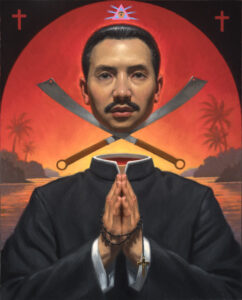Flannery O’Connor; Walker Percy; J.F. Powers: young Catholic novelists may dream of joining the pantheon of 20th century greats, openly Catholic, yet acknowledged by the literary world. But is that even possible any more?
In 2015 Piers Paul Read, a bestselling novelist published by international giant Bloomsbury, suggested that in the UK the answer was “no”:
A novel with an overtly Catholic theme now finds it difficult to find a British publisher: the fine English Catholic novelist Lucy Beckett, having failed to find a publisher in the UK, has her work published by Ignatius Press in San Francisco. My own novel, The Death of a Pope, was published in the U.S. by Ignatius after I was advised by my agent that it was too Catholic in content to be submitted for publication in the UK.
And so a parallel literary world, a “Catholic ghetto,” has emerged in recent years to cope with this new reality. In the US, journals like Dappled Things and Image and publishing houses like Ignatius, Wiseblood, Angelico, and Slant offer Catholic authors a forum, and, perhaps even more crucially, a sense of community. Inspired by Dana Gioia, Catholic scholars, novelists, and poets now gather biannually in cities across the US to celebrate and discuss the “Catholic Literary Imagination.”
This mini-Catholic literary revival is a wonderful thing, and I am one of its many grateful beneficiaries. But for many of us, some nagging doubts remain: shouldn’t we be trying to escape the Catholic ghetto? Shouldn’t we write novels of the human condition that appeal to all kinds of readers, and not just to fellow churchgoers?
I don’t know whether Christopher Beha’s new novel, The Index of Self-Destructive Acts, deliberately sets out to be such a Catholic novel for all seasons, but the results speak for themselves.
Set among the New York media and financial elite after the 2008 financial crisis, The Index is one of those ambitious, era-capturing sagas that recalls Tom Wolfe and Jonathan Franzen. But Beha’s new novel is also concerned with faith in a thoroughgoing way that’s increasingly rare.
Beha, a cradle Catholic who, after falling away, recently reverted, is the author of two previous novels and a 2010 memoir, The Whole Five Feet: What the Great Books Taught Me About Life, Death, and Pretty Much Everything Else, about the year he took off to read the Harvard Classics. In 2019 Beha was appointed the editor at Harper’s, which The New York Times, in reporting on his elevation, called “a hot seat in the world of highbrow journalism.”
Thus, he is a rare believer in the midst of the literary scene, bringing a Catholic perspective to a disenchanted world.
What that entails, exactly, is worth teasing out. The Index is not about what Beha has elsewhere termed “the Catholic experience.” True, the Doyle family at the heart of the book is Catholic. But they are hardly devout.
Kit, the mother, conceives of prayer as a form of relaxing meditation and doubts its power to act in the world. She goes to Mass every few months at best, and avoids the confessional.
By and large, Catholic practice doesn’t play a major role in the book, except when its patterns resurface under other guises in the behavior of former believers whose longing for meaning has outlived the lapse of their faith.
Instead of hagiography, Beha holds up a mirror in which readers full of ambitious dreams and little faith can see themselves flailing in self-deception, addiction, and sickness.
Walker Percy observed that the pleasure that a novel gives is equal to the recognition it inspires: the more the truth of our condition is revealed in the characters, the more we are elated to find our sins exposed and transcended. Beha puts his finger on the human tendency to tragicomic dysfunction, our compulsion to behave in ways no data-driven model would predict, often at great cost to ourselves and others.
This idea, a close cousin to the doctrine of original sin, is expressed in the titular “index,” a baseball stat that refers to hit batsmen, balks, and other pitching miscues. When Frank and “the kid” attend a ballgame, they argue about whether numbers capture the sport’s essence:
“Unbelievable,” Frank said. “We’re going to lose this game on a balk. How many of your computer simulations would you have to run before that happened?”
“Quite a few,” the kid admitted.
Like that hapless losing team, almost everyone in Beha’s novel meets with self-inflicted disgrace: Frank Doyle, a pundit and baseball writer, torpedoes his career by making offensive jokes on live television (the jokes are objectively offensive, rather than just perceived as such by an indignant mob, which anchors this episode firmly in 2009 rather than 2020). Journalist Sam Waxworth, despite his self-declared coolly rational worldview, embarks on an affair that puts his marriage and new job in jeopardy. Other characters get involved in shady schemes, hit “reply all” when they know they shouldn’t, or suffer illness or addiction without recognizing how weakened and enslaved they have become.
“Something in us wanted to be irrational,” Waxworth thinks at one point. “Something wanted, perhaps, to be wrong.”
Beha suggests these unforced errors are symptoms, the sort of glitch that happens when we don’t face up to our longing for eternity. “Nothing would be returned to us in the fullness of time, because time had no fullness,” Frank thinks despairingly on his deathbed. “It was a constant emptying.” He yearns for “a recording angel” to preserve the instants slipping away, the memories and unrealized projects that will die with him.
When a self-styled prophet named Herman Nash predicts the end of the world, Frank’s daughter Margo reflects that his “great mistake was not to believe that the world would come to an end, but to think that it wasn’t ending every day.” Camus once wrote something similar: “Do not wait for the Last Judgment. It takes place every day.”
Christianity, in Beha’s novel, is less an objective truth that breaks into our lives, compelling assent, than the answer to a subjective, existential predicament. Repeated self-sabotage breaks down trust in the sovereign individual self, leading to a quest—“the search,” as Walker Percy put it—for a transcendent lifeline. Similarly, Frank’s desire to have his life omnisciently transcribed is a sign that we are, inescapably, religious beings, straining toward the infinite.
Nash, the streetcorner preacher with an internet following, is a touchstone for these longings. When a benefactor launches a full-fledged PR campaign to push Nash’s forecast of doom, billboards and even a television spot during the World Series ask a portentous question: “What would you change if you knew it was all going to end? November 1, 2009, 10 o’clock?”
Is Nash a lunatic or a con artist? He could be either. Yet his call to repentance resonates, both in our world and in Beha’s fictional one. We live in a culture which distracts us from—and lures us to—death, but the great questions nag at our hearts.
Frank Doyle’s son, Eddie, an Iraq War vet, is one of those touched by Nash’s message. Eddie first sees the preacher performing ad hoc baptisms in the fountain in Washington Square and ends up following him home. There Eddie makes an impromptu confession (“God’s power is greater than any sin,” Nash assures him) and is dunked in a bathtub:
Eddie had anticipated a sense of peace coming over him, but he felt instead exhilaration, as though he’d been walking around with weights on, and now that they had been removed he had a great store of energy and strength. Nash handed Eddie a towel from the rack by the sink, and he retreated discreetly from the room while Eddie dried off his face and hair. When he’d finished, Eddie didn’t go straight outside. He stayed by himself, seated on the edge of the bath, trying to catch his breath.
Eddie grew up Catholic. He has not so much repudiated the faith as found his parents’ lukewarm way of living it out unpersuasive. When eventually he moves in with Nash, the man’s preaching has “a kind of familiarity. So much of it was already somewhere inside of Eddie. He’d thought he’d left the church behind when he went off to college, but thirteen years of Catholic school had left more traces than he’d imagined. He felt as though he were coming home, rather than embarking on an entirely new practice.”
A true seeker, Eddie is humble enough to admit his desire for God, and willing to give of himself. He simply never encountered models of holiness who could make the Christian message vibrant and plausible. His scripture-quoting roommate turns out to be less reliable than anticipated, but through him Eddie rediscovers the power of the sacraments, if only in ersatz form.
Suffering from both crippling jealousy and a strange physical ailment, Waxworth’s wife Lucy also turns to a healer. Someone presses a flyer into her hand on the street: “Ms. Clara Luna says: DON’T GIVE UP!! […] SHE […] can bring the SPIRIT OF RELEASE and CONTROL […] There is a Doctor of all doctors. WHEN YOUR CASE SEEMS HOPELESS THERE IS A REMEDY FOR YOU.”
Lit by candles and fragrant with incense, Lucy’s awkward, comical visit with Clara Luna isn’t as satirical as it sounds. Rather than mocking alternative liturgies, Beha seems to be asking what their existence says about our craving for sacramental absolution.
Nash ends up being wrong, of course—the world does not end. But his prophecy comes true individually for Frank, Kit, Eddie, and the rest.
At first, these minor apocalypses produce a rosy foretaste of resolution. Disaster thickens family bonds. Margo and Sam experience moments of clarity—they seem to have come through a decisive ordeal. Yet just when the story seems poised to leave at least some characters sitting pretty, Beha resists the temptation to tidiness. Fortunes are lost; redemptive arcs unravel; couples split up, in spite of rectified intentions and sincere apologies.
While this life offers many good things, ultimate happiness is not among them.
Beha’s ability to reveal upward yearnings and sacramental patterns, as well as his refusal of what Joshua Hren has called “easy exits,” bespeaks a Catholic sensibility no less palpable for being largely implicit. What is missing here, perhaps, is confidence in what lies beyond the secular, a sense that not only do we long for the infinite, but that the infinite also longs for us.
In our days of diversity quotas and cancel culture, we need a “Benedict Option,” wherein Catholic talent can stretch its limbs freely. But to ensure the work is not only well-intentioned but also really good, we shouldn’t shy from the standard of the “Beha Option,” which wins readers who don’t necessarily share the author’s faith. No work can succeed, commercially but also aesthetically, unless it touches what all of us share: the inescapable human condition.
For today’s believing writer, Beha’s achievement in The Index of Self-Destructive Acts strikes me as an unavoidable reference point.
Trevor Cribben Merrill is the author of a novel, Minor Indignities (Wiseblood Books, 2020). His writing has appeared in The University Bookman, Dappled Things, and The American Conservative, among others.




